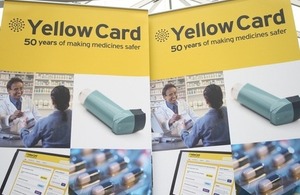Yellow Card Scheme looks to the future at 50th anniversary forum
The MHRA today hosted an expert stakeholder forum to develop a future roadmap for the Yellow Card Scheme, as the adverse reaction reporting system celebrates its 50th anniversary.

Yellow Card promo poster
In 1964, in the wake of the thalidomide disaster, the Yellow Card Scheme was established in the UK to collect suspected adverse drug reactions (ADRs) to provide an early warning of possible hazards. The scheme allows health professionals, patients, parents and carers to report suspected ADRs on a voluntary basis alongside those collected from the pharmaceutical industry. To coincide with the 50th anniversary of the Scheme, a new single reporting website has just been launched to support increased reporting and awareness.
Over 750,000 Yellow Cards have been received since the scheme’s inception. It has been estimated that only 85% of healthcare professionals, the largest group of Yellow Card reporters who have a responsibility to report adverse drug reactions, are aware of the Scheme.
Speaking at the event where he launched the new Yellow Card website, Life Sciences Minister George Freeman said:
The Yellow Card Scheme has played a vital role in the safety of medicines for the last 50 years. The new website updates the scheme for the 21st century, which will improve safety reporting and ultimately better protect people’s health.
Around 25,000 ADR reports are received each year, about 7% directly from patients who have been reporting since 2005 and who continue to play a valuable role in helping MHRA in its role as the UK’s medicines and medical products regulator.
At today’s forum, MHRA signed up to NHS England’s Sign up to Safety Campaign. Sign up to Safety is designed to help realise the ambition of making the NHS the safest healthcare system in the world and in 3 years aims to reduce avoidable harm by 50% and save 6,000 lives.
Dr Suzette Woodward, National Campaign Director, Sign up to Safety said:
I am thrilled that the MHRA has committed to join Sign up to Safety. The MHRA supports the NHS to improve the health and safety of millions of people who use it every day, so to have them helping us achieve our aim to reduce harm and save lives is vital.
MHRA Chief Executive Officer, Dr Ian Hudson, added:
It is absolutely right that MHRA signs up to the campaign. There is an ever-increasing public and media interest in the availability of medicines and their safety, new medicines are delivered more rapidly to the market place than ever before, and more medicines are available without a doctor’s prescription. As we seek to embed a philosophy of reporting into the healthcare system and through better education, the number of Yellow Card reports must continue to rise.
I’d like to thank my colleagues, particularly in the Vigilance and Risk Management of Medicines Division and everyone who has attended today’s event whose enthusiasm and expertise will shape the agency’s innovative and cost-effective approach to meet its fundamental objective of protecting public health.
The new Yellow Card website can be found at www.mhra.gov.uk/yellowcard.
Background
-
Please contact MHRA press office on 020 3080 7651 or email press.office@mhra.gsi.gov.uk for a photo of Minister George Freeman, MHRA CEO Dr Ian Hudson and Dr Suzette Woodward, National Campaign Director, Sign Up to Safety
-
The Vigilance and Risk Management of Medicines Division of the MHRA is responsible for monitoring the safety of all medicines on the UK market. The Commission on Human Medicines is responsible for the Yellow Card Scheme, which is run on the Commission’s behalf by MHRA.
-
The Yellow Card Scheme is MHRA’s system of monitoring the safety of medicines in the UK and it acts as an early warning system to identify new and strengthen existing safety information about medicines. Yellow Cards are used alongside other scientific safety information to help MHRA to take action, if necessary, to make changes to the warnings given to people taking a medicine or review the way the medicine is used to maximise benefit and minimise the risk to the patient.
-
Yellow Cards are processed rapidly, according to tight timelines set out in legislation, in order to ensure that data from the reports are available in for analysis as quickly as possible for inclusion in the single detection process.
-
The Yellow Card Scheme has been in existence for five decades. Despite its limitations, which are common to all spontaneous reporting schemes, it has a proven track record in the identification of previously unrecognised safety hazards. The Scheme has undergone continual evaluation and development over the years, and this will continue to fulfil its central role in the UK pharmacovigilance in the changing climate in which it operates. At the same time it will continue to adhere to the key principles defined by Sir Derrick Dunlop at the inception of the scheme: spontaneity and speed, confidentiality and above all the commitment of health professionals and patients to report their suspicions in the interest of protecting public health.
-
For further information on the NHS England Sign Up To Safety Campaign http://www.england.nhs.uk/signuptosafety/
-
The Medicines and Healthcare Products Regulatory Agency is responsible for protecting and improving the health of millions of people every day through the effective regulation of medicines and medical devices, underpinned by science and research. The agency consists of three centres: the MHRA, the Clinical Practice Research Datalink, and the National Institute for Biological Standards and Control.